高中英语必修4课文(自打)
- 格式:doc
- 大小:71.05 KB
- 文档页数:12
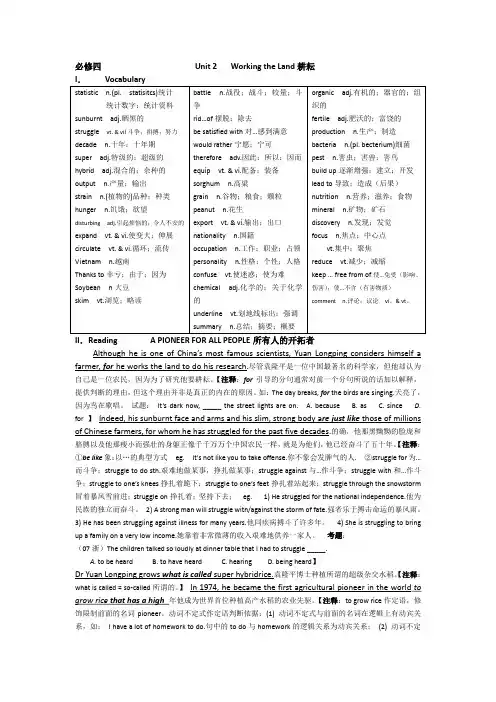
必修四Unit 2 Working the Land耕耘II.Reading A PIONEER FOR ALL PEOPLE所有人的开拓者Although he is one of China’s most famous scientists, Yuan Longping considers himself a farmer, for he works the land to do his research.尽管袁隆平是一位中国最著名的科学家,但他却认为自己是一位农民,因为为了研究他要耕耘。
【注释:for引导的分句通常对前一个分句所说的话加以解释,提供判断的理由,但这个理由并非是真正的内在的原因。
如:The day breaks, for the birds are singing.天亮了,因为鸟在歌唱。
试题:It’s dark now, _____ the street lights are on. A. because B. as C. since D. for 】Indeed, his sunburnt face and arms and his slim, strong body a re just like those of millions of Chinese farmers, for whom he has struggled for the past five decades.的确,他那黑黝黝的脸庞和胳膊以及他那瘦小而强壮的身躯正像千千万万个中国农民一样,就是为他们,他已经奋斗了五十年。
【注释:①be like象:以…的典型方式eg. It's not like you to take offense.你不象会发脾气的人. ②struggle for为…而斗争;struggle to do sth.艰难地做某事,挣扎做某事;struggle against与…作斗争;struggle with和…作斗争;struggle to on e’s knees挣扎着跪下;struggle to one’s feet挣扎着站起来;struggle through the snowstorm 冒着暴风雪前进;struggle on挣扎着;坚持下去;eg. 1) He struggled for the national independence.他为民族的独立而奋斗。
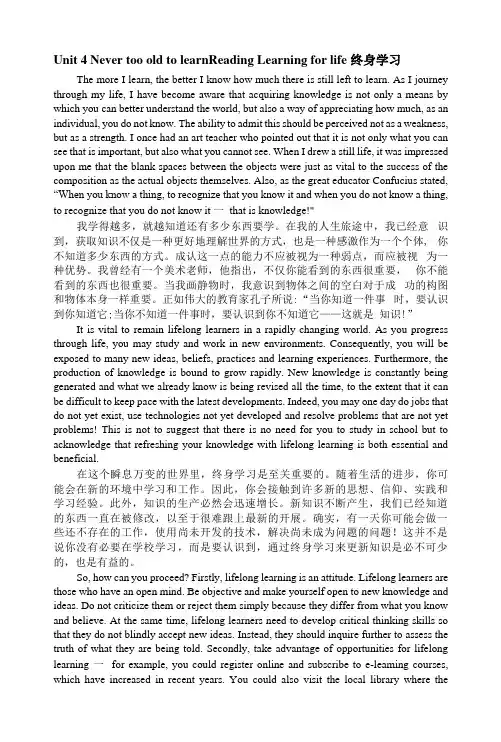
Unit 4 Never too old to learnReading Learning for life 终身学习The more I learn, the better I know how much there is still left to learn. As I journey through my life, I have become aware that acquiring knowledge is not only a means by which you can better understand the world, but also a way of appreciating how much, as an individual, you do not know. The ability to admit this should be perceived not as a weakness, but as a strength. I once had an art teacher who pointed out that it is not only what you can see that is important, but also what you cannot see. When I drew a still life, it was impressed upon me that the blank spaces between the objects were just as vital to the success of the composition as the actual objects themselves. Also, as the great educator Confucius stated, “When you know a thing, to recognize t hat you know it and when you do not know a thing, to recognize that you do not know it 一that is knowledge!"我学得越多,就越知道还有多少东西要学。
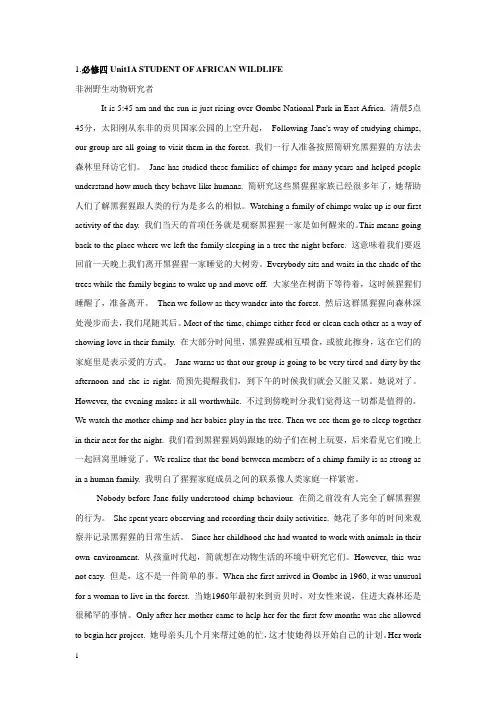
1.必修四Unit1A STUDENT OF AFRICAN WILDLIFE非洲野生动物研究者It is 5:45 am and the sun is just rising over Gombe National Park in East Africa. 清晨5点45分,太阳刚从东非的贡贝国家公园的上空升起,Following Jane's way of studying chimps, our group are all going to visit them in the forest. 我们一行人准备按照简研究黑猩猩的方法去森林里拜访它们。
Jane has studied these families of chimps for many years and helped people understand how much they behave like humans. 简研究这些黑猩猩家族已经很多年了,她帮助人们了解黑猩猩跟人类的行为是多么的相似。
Watching a family of chimps wake up is our first activity of the day. 我们当天的首项任务就是观察黑猩猩一家是如何醒来的。
This means going back to the place where we left the family sleeping in a tree the night before. 这意味着我们要返回前一天晚上我们离开黑猩猩一家睡觉的大树旁。
Everybody sits and waits in the shade of the trees while the family begins to wake up and move off. 大家坐在树荫下等待着,这时候猩猩们睡醒了,准备离开。
Then we follow as they wander into the forest. 然后这群黑猩猩向森林深处漫步而去,我们尾随其后。
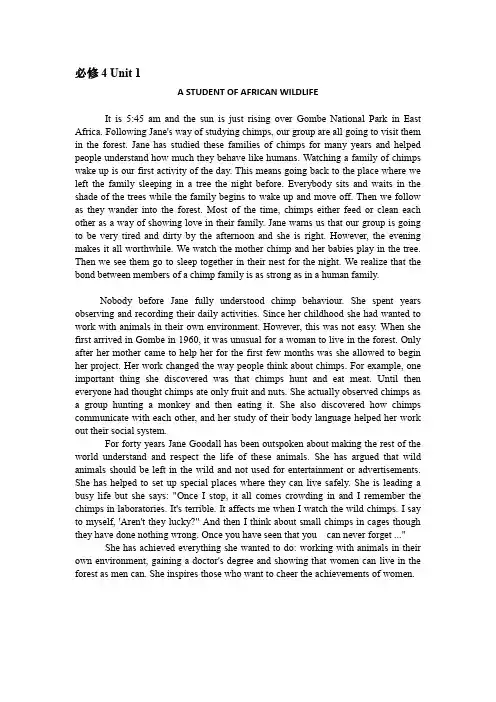
必修4 Unit 1A STUDENT OF AFRICAN WILDLIFEIt is 5:45 am and the sun is just rising over Gombe National Park in East Africa. Following Jane's way of studying chimps, our group are all going to visit them in the forest. Jane has studied these families of chimps for many years and helped people understand how much they behave like humans. Watching a family of chimps wake up is our first activity of the day. This means going back to the place where we left the family sleeping in a tree the night before. Everybody sits and waits in the shade of the trees while the family begins to wake up and move off. Then we follow as they wander into the forest. Most of the time, chimps either feed or clean each other as a way of showing love in their family. Jane warns us that our group is going to be very tired and dirty by the afternoon and she is right. However, the evening makes it all worthwhile. We watch the mother chimp and her babies play in the tree. Then we see them go to sleep together in their nest for the night. We realize that the bond between members of a chimp family is as strong as in a human family.Nobody before Jane fully understood chimp behaviour. She spent years observing and recording their daily activities. Since her childhood she had wanted to work with animals in their own environment. However, this was not easy. When she first arrived in Gombe in 1960, it was unusual for a woman to live in the forest. Only after her mother came to help her for the first few months was she allowed to begin her project. Her work changed the way people think about chimps. For example, one important thing she discovered was that chimps hunt and eat meat. Until then everyone had thought chimps ate only fruit and nuts. She actually observed chimps as a group hunting a monkey and then eating it. She also discovered how chimps communicate with each other, and her study of their body language helped her work out their social system.For forty years Jane Goodall has been outspoken about making the rest of the world understand and respect the life of these animals. She has argued that wild animals should be left in the wild and not used for entertainment or advertisements. She has helped to set up special places where they can live safely. She is leading a busy life but she says: "Once I stop, it all comes crowding in and I remember the chimps in laboratories. It's terrible. It affects me when I watch the wild chimps. I say to myself, 'Aren't they lucky?" And then I think about small chimps in cages though they have done nothing wrong. Once you have seen that you can never forget ..."She has achieved everything she wanted to do: working with animals in their own environment, gaining a doctor's degree and showing that women can live in the forest as men can. She inspires those who want to cheer the achievements of women.WHY NOT CARRY ON HER GOOD WORK?I enjoyed English, biology, and chemistry at school, but which one should I choose to study at university? I did not know the answer until one evening when I sat down at the computer to do some research on great women of China.By chance I came across an article about a doctor called Lin Qiaozhi, a specialist in women's diseases. She lived from 1901 to 1983. It seemed that she had been very busy in her chosen career, travelling abroad to study as well as writing books and articles. One of them caught my eye. It was a smallbook explaining how to cut the death rate from having and caring for babies. She gave some simple rules to follow for keeping babies clean, healthy and free from sickness. Why did she write that? Who were the women that Lin Qiaozhi thought needed this advice? I looked carefully at the text andrealized that it was intended for women in the countryside. Perhaps if they had an emergency they could not reach a doctor.Suddenly it hit me how difficult it was for a woman to get medical training at that time. That was a generation when girls' education was always placed second to boys'. Was she so much cleverer than anyone else? Further reading made me realize that it was hard work and determination as well as her gentle nature that got her into medical school. What made her succeed later on was the kindness and consideration she showed to all her patients. There was story after story of how Lin Qiaozhi, tired after a day's work, went late at night to deliver a baby for a poor family who could not pay her.By now I could not wait to find out more about her. I discovered that Lin Qiaozhi had devoted her whole life to her patients and had chosen not to have a family of her own. Instead she made sure that about 50,000 babies were safely delivered. By this time I was very excited. Why not study at medical college like Lin Qiaozhi and carry on her good work? It was still not too late for me to improve my studies, prepare for the university entrance examinations, and….必修4 Unit 2A PIONEER FOR ALL PEOPLEAlthough he is one of China's most famous scientists, Yuan Longping considers himself a farmer, for he works the land to do his research. Indeed, his sunburnt face and arms and his slim, strong body are just like those of millions of Chinese farmers, for whom he has struggled for the past five decades. Dr Yuan Longping grows what is called super hybrid rice. In 1974, he became the firstagricultural pioneer in the world to grow rice that has a high output. This special strain of rice makes it possible to produce one-third more of the crop in the same fields. Now more than 60% of the rice produced in China each year is from this hybrid strain.Born into a poor farmer's family in 1930, Dr Yuan graduated from Southwest Agricultural College in 1953. Since then, finding ways to grow more rice has been his life goal. As a young man, he saw the great need for increasing the rice output. At that time, hunger was a disturbing problem in many parts of the countryside. Dr Yuan searched for a way to increase rice harvests without expanding the area of the fields. In 1950, Chinese farmers could produce only fifty million tons of rice. In a recent harvest, however, nearly two hundred million tons of rice was produced. These increased harvests mean that 22% of the world's people are fed from just 7% of the farmland in China. Dr Yuan is now circulating his knowledge in India, Vietnam and many other less developed countries to increase their rice harvests. Thanks to his research, the UN has more tools in the battle to rid the world of hunger. Using his hybrid rice, farmers are producing harvests twice as large as before.Dr Yuan is quite satisfied with his life. However, he doesn't care about being famous. He feels it gives him less freedom to do his research. He would much rather keep time for his hobbles. He enjoys listening to violin music, playing mah-jong, swimming and reading. Spending money on himself or leading a comfortable life also means very little to him. Indeed, he believes that a person with too much money has more rather than fewer troubles. He therefore gives millions of yuan to equip others for their research in agriculture.Just dreaming for things, however, costs nothing. Long ago Dr yuan had a dream about rice plants as tall as sorghum. Each ear of rice was as big as an ear of corn and each grain of rice was as huge as a peanut. Dr Yuan awoke from his dream with the hope of producing a kind of rice that could feed more people. Now, many years later, Dr Yuan has another dream: to export his rice so that it can be grown around the globe. One dream is not always enough, especially for a person who loves and cares for his people.CHEMICAL OR ORGANIC FARMING?Over the past half century, using chemical fertilizers has become very common in farming. Many farmers welcomed them as a great way to stop crop disease and increase production. Recently, however, scientists have been finding that long-term use of these fertilizers can cause damage to the land and, even more dangerous, to people's health.What are some of the problems caused by chemical fertilizers? First, they damage the land by killing the helpful bacteria and pests as well as the harmful ones. Chemicals also stay in the ground and underground water for a long time. This affects crops and, therefore, animals and humans, since chemicals get inside the crops and cannot just be washed off. These chemicals in the food supply build up in people's bodies over time. Many of these chemicals can lead to cancer or other illnesses. In addition, fruit, vegetables and other food grown with chemical fertilizers usually grow too fast to be full of much nutrition. They may look beautiful, but inside there is usually more water than vitamins and minerals.With these discoveries, some farmers and many customers are beginning to turn to organic farming. Organic farming is simply farming without using any chemicals. They focus on keeping their soil rich and free of disease. A healthy soil reduces disease and helps crops grow strong and healthy. Organic farmers, therefore, often prefer using natural waste from animals as fertilizer. They feel that this makes the soil in their fields richer in minerals and so more fertile. This also keeps the air, soil, water and crops free from chemicals.Organic farmers also use many other methods to keep the soil fertile. They often change the kind of crop in each field every few years, for example, growing corn or wheat and then the next year peas or soybeans. Crops such as peas or soybeans put important minerals back into the soil, making it ready for crops such as wheat or corn that need rich and fertile soil. Organic farmers also plant crops to use different levels of soil, for example, planting peanuts that use the ground's surface followed by vegetables that put down deep roots. Some organic farmers prefer planting grass between crops to prevent wind or water from carrying away the soil, and then leaving it in the ground to become a natural fertilizer for the next year's crop. These many different organic farming methods have the same goal: to grow good food and avoid damaging the environment or people's health.必修4 Unit 3A MASTER OF NONVERBAL HUMOURAs Victor Hugo once said, "Laughter is the sun that drives winter from the human face", and up to now nobody has been able to do this better than Charlie Chaplin. He brightened the lives of Americans and British through two world wars and the hard years in between. He made people laugh at a time when they felt depressed, so they could feel more content with their lives.Not that Charlie's own life was easy! He was born in a poor family in 1889. Hisparents were both poor music hall performers. You may find it astonishing that Charlie was taught to sing as soon as he could speak and dance as soon as he could walk. Such training was common in acting families at this time, especially when the family income was often uncertain. Unfortunately his father died, leaving the family even worse off, so Charlie spent his childhood looking after his sick mother and his brother. By his teens, Charlie had, through his humour, become one of the most popular child actors in England. He could mime and act the fool doing ordinary everyday tasks. No one was ever bored watching him -his subtle acting made everything entertaining.As time went by, he began making films. He grew more and more popular as his charming character, the little tramp, became known throughout the world. The tramp, a poor, homeless man with a moustache, wore large trousers, worn-out shoes and a small round black hat. He walked around stiffly carrying a walking stick. This character was a social failure but was loved for his optimism and determination to overcome all difficulties. He was the underdog who was kind even when others were unkind to him.How did the little tramp make a sad situation entertaining? Here is an example from one of his most famous films, The Gold Rush. It is the mid-nineteenth century and gold has just been discovered in California. Like so many others, the little tramp and his friend have rushed there in search of gold, but without success. Instead they are hiding in a small hut on the edge of a mountain during a snowstorm with nothing to eat. They are so hungry that they try boiling a pair of leather shoes for their dinner. Charlie first picks out the laces and eats them as if they were spaghetti. Then he cuts off the leather top of the shoe as if it were the finest steak. Finally he tries cutting and chewing the bottom of the shoe. He eats each mouthful with great enjoyment. The acting is so convincing that it makes you believe that it is one of the best meals he has ever tasted!Charlie Chaplin wrote, directed and produced the films he starred in. In 1972 he was given a special Oscar for his outstanding work in films. He lived in England and the USA but spent his last years in Switzerland, where he was buried in 1977. He is loved and remembered as a great actor who could inspire people with great confidence.ENGLISH JOKES1 There are thousands of jokes which use "play on words" to amuse us. One person asks a question which expects a particular reply. Instead, what he gets is another kind of answer which makes the situation funny. Now read some of these customer and waiter jokes. Can you match the joke with the explanation?1 C: What's that fly doing in my soup?W: Swimming, I think!2 C: What's that?W: It's bean soup.C: I don't want to know what it's been. I want to know what it is now.3 C: Waiter, will the pancakes be long?W: No, sir. Round.2 Some jokes are longer and tell a short, funny story. The following is one of those jokes about the famous detective Sherlock Holmes and his friend Doctor Watson. Read it and decide which of these two kinds of jokes you like better. Give your reasons.Sherlock Holmes and Doctor Watson went camping in a mountainous area. They were lying in the open air under the stars. Sherlock Holmes looked up at the stars and whispered, "Watson, when you look at that beautiful sky, what do you think of?" Watson replied, "I think of how short life is and how long the universe has lasted." "No, no, Watson!" Holmes said. "What do you really think of?." Watson tried again. "I think of how small I am and how vast the sky is." "Try again, Watson!" said Holmes. Watson tried a third time. "I think of how cold the universe is and how warm people can be in their beds." Holmes said, "Watson, you fool! You should be thinking that someone has stolen our tent!"必修4 Unit 4COMMUNICATION: NO PROBLEM?Yesterday, another student and I, representing our university's student association, went to the Capital International Airport to meet this year's international students. They were coming to study at Beijing University. We would take them first to their dormitories and then to the student canteen. After half an hour of waiting fortheir flight to arrive, I saw several young people enter the waiting area looking around curiously. I stood for a minute watching them and then went to greet them.The first person to arrive was Tony Garcia from Colombia, closely followed by Julia Smith from Britain. After I met them and then introduced them to each other, I was very surprised. Tony approached Julia, touched her shoulder and kissed her on the cheek! She stepped back appearing surprised and put up her hands, as if in defence.I guessed that there was probably a major misunderstanding. Then Akira Nagata from Japan came in smiling, together with George Cook from Canada. As they were introduced, George reached his hand out to the Japanese student. Just at that moment, however, Akira bowed so his nose touched George's moving hand. They both apologized - another cultural mistake!Ahmed Aziz, another international student, was from Jordan. When we met yesterday, he moved very close to me as I introduced myself. I moved back a bit, but he came closer to ask a question and then shook my hand. When Darlene Coulon from France came dashing through the door, she recognized Tony Garcia's smiling face. They shook hands and then kissed each other twice on each cheek, since that is the French custom when adults meet people they know. Ahmed Aziz., on the contrary, simply nodded at the girls. Men from Middle Eastern and other Muslim countries will often stand quite close to other men to talk but will usually not touch women.As I get to know more international friends, I learn more about this cultural "body language". Not all cultures greet each other the same way, nor are they comfortable in the same way with touching or distance between people. In the same way that people communicate with spoken language, they also express their feelings using unspoken "language" through physical distance, actions or posture. English people, for example, do not usually stand very close to others or touch strangers as soon as they meet. However, people from places like Spain, Italy or South American countries approach others closely and are more likely to touch them. Most people around the world now greet each other by shaking hands, but some cultures use other greetings as well, such as the Japanese, who prefer to bow.These actions are not good or bad, but are simply ways in which cultures have developed. I have seen, however, that cultural customs for body language are very general - not all members of a culture behave in the same way. In general, though, studying international customs can certainly help avoid difficulties in today's world of cultural crossroads!SHOWING OUR FEELINGSBody language is one of the most powerful means of communication, often even more powerful than spoken language. People around the world show all kinds of feelings, wishes and attitudes that they might never speak aloud. It is possible to "read" others around us, even if they do not intend for us to catch their unspoken communication. Of course, body language can be misread, but many gestures and actions are universal.The most universal facial expression is, of course, the smile – its function is to show happiness and put people at ease. It does not always mean that we are truly happy, however. Smiles around the world can be false, hiding other feelings like anger, fear or worry. There are unhappy smiles, such as when someone "loses face" and smiles to hide it. However, the general purpose of smiling is to show good feelings.From the time we are babies, we show unhappiness or anger by frowning. In most places around the world, frowning and turning one's back to someone shows anger. Making a fist and shaking it almost always means that someone is angry and threatening another person.There are many ways around the world to show agreement, but nodding the head up and down is used for agreement, almost worldwide. Most people also understand that shaking the head from side to side means disagreement or refusal.How about showing that I am bored? Looking away from people or yawning will, in most cases, make me appear to be uninterested. However, if I turn toward and look at someone or something, people from almost every culture will think that I am interested. If I roll my eyes and turn my head away, I most likely do not believe what I am hearing or do not like it.Being respectful to people is subjective, based on each culture, but in general it is probably not a good idea to give a hug to a boss or teacher. In almost every culture, it is not usually good to stand too close to someone of a higher rank. Standing at a little distance with open hands will show that I am willing to listen.With so many cultural differences between people, it is great to have some similarities in body language. We can often be wrong about each other, so it is an amazing thing that we understand each other as well as we do!必修4 Unit 5THEME PARKS — FUN AND MORE THAN FUNWhich theme park would you like to visit? There are various kinds of theme parks, with a different park for almost everything: food, culture, science, cartoons, movies or history. Some parks are famous for having the biggest or longest roller coasters, others for showing the famous sights and sounds of a culture. Whichever and whatever you like, there is a theme park for you!The theme park you are probably most familiar with is Disneyland. It can be found in several parts of the world. It will bring you into a magical world and make your dreams come true, whether traveling through space, visiting a pirate ship or meeting your favourite fairy tale or Disney cartoon character. As you wander around the fantasy amusement park, you may see Snow White or Mickey Mouse in a parade or on the street. Of course Disneyland also has many exciting rides, from giant swinging ships to terrifying free-fall drops. With all these attractions, no wonder tourism is increasing wherever there is a Disneyland. If you want to have fun and more than fun, come to Disneyland!Dollywood, in the beautiful Smoky Mountains in the southeasternUSA, is one of the most unique theme parks in the world. Dollywood shows and celebrates America's traditional southeastern culture. Although Dollywood has rides, the park's main attraction is its culture. Famous country music groups perform there all year in indoor and outdoor theatres. People come from all over America to see carpenters and other craftsmen make wood, glass and iron objects in the old-fashioned way. Visit the candy shop to try the same kind of candy that American southerners made 150 years ago, or take a ride on the only steam- engine train still working in the southeast USA. You can even see beautiful bald eagles in the world's largest bald eagle preserve. And for those who like rides, Dollywood has one of the best old wooden roller coasters, Thunderhead. It is world-famous for having the most length in the smallest space. Come to Dollywood to have fun learning all about America's historical southeastern culture!If you want to experience the ancient days and great deeds of English knights and ladies, princes and queens, then England's Camelot Park is the place for you. Every area of the park is modelled after life in the days of King Arthur and the Knights of the Round Table. In one place, you can watch magic shows with Merlin the Wizard. If you want to see fighting with swords or on horseback, then the jousting area is a good place to visit. If you do well there, King Arthur may choose you to fight in the big jousting tournament. Do you like animals? Then visit the farm area, and learn how people in ancient England ran their farms and took care of their animals. To enter a world of fantasy about ancient England, come to Camelot Park!FUTUROSCOP —EXCITEMENT AND LEARNINGLast week I took a journey deep into space, to the end of the solar system, and was pulled into a black hole. Then I took a trip to Brazil and experienced surviving an airplane crash in the jungle. After that, I joined some divers and went to the bottom of the ocean to see strange blind creatures that have never seen sunlight. For a break, I took part in some car racing and then skied down some of the most difficult mountains in the world. I ended my travels by meeting face to face with a dinosaur, the terrible T-Rex, and survived the experience!I did all this in one great day at Futuroscope. Opened in 1987, Futuroscope is one of the largest space-age parks in the world. This science and technology-based theme park in France uses the most advanced technology. Its 3-D cinemas and giant movie screens provide brand new experiences of the earth and beyond. Visitors can get close to parts of the world they have never experienced, going to the bottom of the ocean, flying through the jungle or visiting the edges of the solar system. The amazing, up-to-date information together with many opportunities for hands-on learning makes the world come to life in a completely new way for visitors. Learning centres throughout the park let visitors try their own scientific experiments, as well as learn more about space travel, the undersea world and much mote.I bought tickets for myself and my friends at the park's entrance, but tickets are also available online. Futuroscope is not only for individuals, but is also the perfect mix of fun and learning for class outings. Classes or other large groups that let Futuroscope know their plans in advance can get the group admission rate. For anyone coming from out of town, Futuroscope has many excellent hotels nearby, most of which provide a shuttle service to the park. If driving, Futuroscope is within easy reach of the freeway. Plan your trip well before starting, since Futuroscope has so many shows, activities and great souvenir shops that it is difficult to see them all. Come ready to walk a lot -be sure to wear some comfortable sneakers or other walking shoes!。
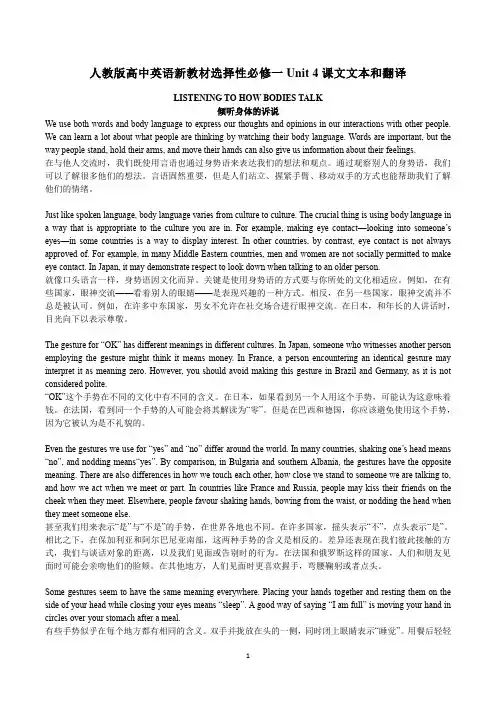
人教版高中英语新教材选择性必修一Unit 4课文文本和翻译LISTENING TO HOW BODIES TALK倾听身体的诉说We use both words and body language to express our thoughts and opinions in our interactions with other people. We can learn a lot about what people are thinking by watching their body language. Words are important, but the way people stand, hold their arms, and move their hands can also give us information about their feelings.在与他人交流时,我们既使用言语也通过身势语来表达我们的想法和观点。
通过观察别人的身势语,我们可以了解很多他们的想法。
言语固然重要,但是人们站立、握紧手臂、移动双手的方式也能帮助我们了解他们的情绪。
Just like spoken language, body language varies from culture to culture. The crucial thing is using body language in a way that is appropriate to the culture you are in. For example, making eye contact—looking into someone’s eyes—in some countries is a way to display interest. In other countries, by contrast, eye contact is not always approved of. For example, in many Middle Eastern countries, men and women are not socially permitted to make eye contact. In Japan, it may demonstrate respect to look down when talking to an older person.就像口头语言一样,身势语因文化而异。
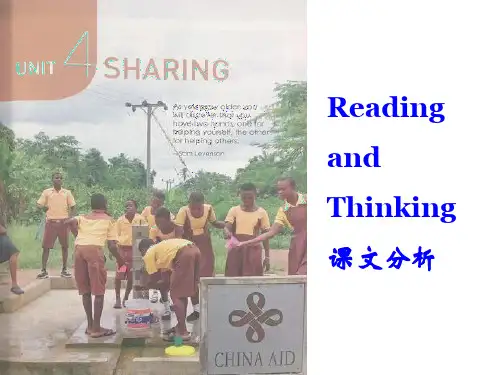
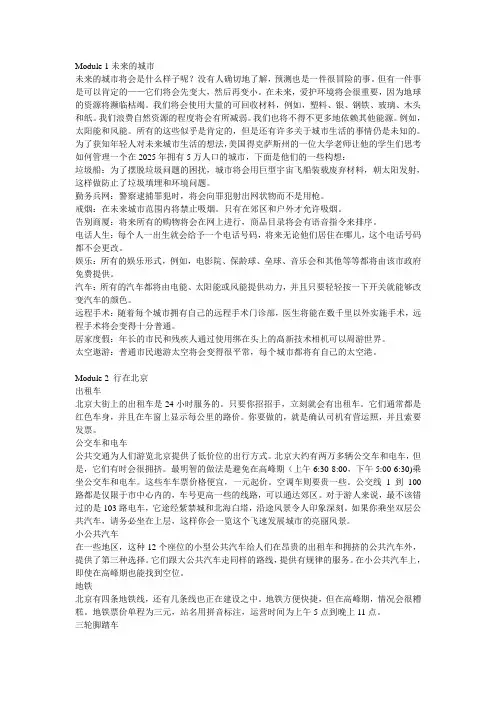
Module 1未来的城市未来的城市将会是什么样子呢?没有人确切地了解,预测也是一件很冒险的事。
但有一件事是可以肯定的——它们将会先变大,然后再变小。
在未来,爱护环境将会很重要,因为地球的资源将濒临枯竭。
我们将会使用大量的可回收材料,例如,塑料、银、钢铁、玻璃、木头和纸。
我们浪费自然资源的程度将会有所减弱。
我们也将不得不更多地依赖其他能源。
例如,太阳能和风能。
所有的这些似乎是肯定的,但是还有许多关于城市生活的事情仍是未知的。
为了获知年轻人对未来城市生活的想法,美国得克萨斯州的一位大学老师让他的学生们思考如何管理一个在2025年拥有5万人口的城市,下面是他们的一些构想:垃圾船:为了摆脱垃圾问题的困扰,城市将会用巨型宇宙飞船装载废弃材料,朝太阳发射,这样做防止了垃圾填埋和环境问题。
勤务兵网:警察逮捕罪犯时,将会向罪犯射出网状物而不是用枪。
戒烟:在未来城市范围内将禁止吸烟。
只有在郊区和户外才允许吸烟。
告别商厦:将来所有的购物将会在网上进行,商品目录将会有语音指令来排序。
电话人生:每个人一出生就会给予一个电话号码,将来无论他们居住在哪儿,这个电话号码都不会更改。
娱乐:所有的娱乐形式,例如,电影院、保龄球、垒球、音乐会和其他等等都将由该市政府免费提供。
汽车:所有的汽车都将由电能、太阳能或风能提供动力,并且只要轻轻按一下开关就能够改变汽车的颜色。
远程手术:随着每个城市拥有自己的远程手术门诊部,医生将能在数千里以外实施手术,远程手术将会变得十分普通。
居家度假:年长的市民和残疾人通过使用绑在头上的髙新技术相机可以周游世界。
太空遨游:普通市民遨游太空将会变得很平常,每个城市都将有自己的太空港。
Module 2 行在北京出租车北京大街上的出租车是24小时服务的。
只要你招招手,立刻就会有出租车。
它们通常都是红色车身,并且在车窗上显示每公里的路价。
你要做的,就是确认司机有营运照,并且索要发票。
公交车和电车公共交通为人们游览北京提供了低价位的出行方式。
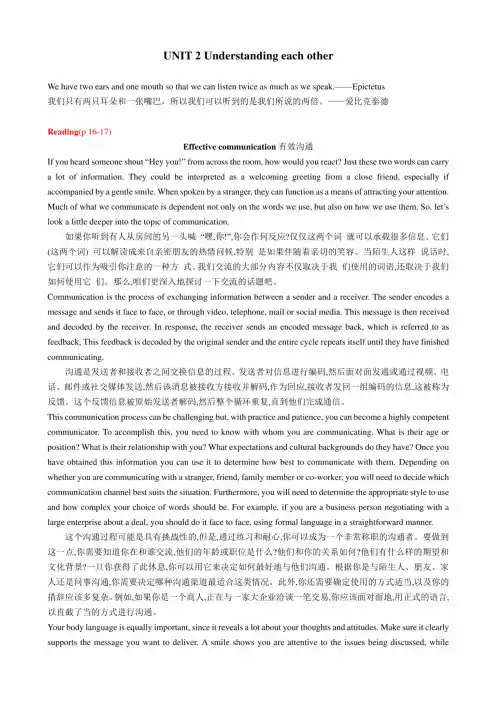
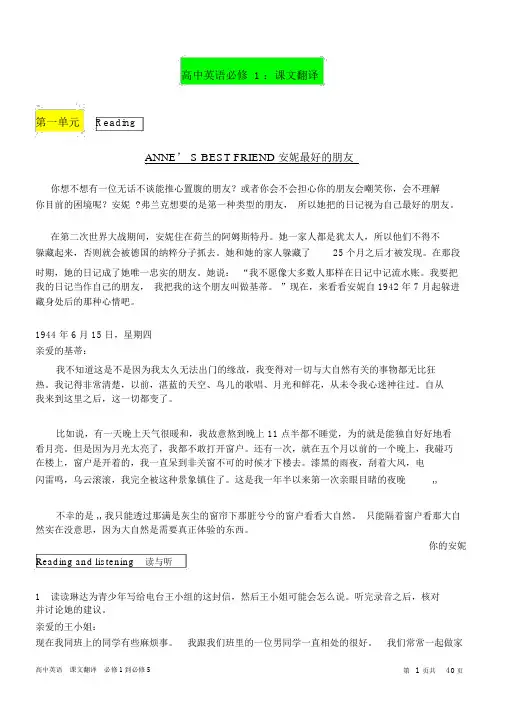
高中英语必修 1 :课文翻译第一单元ReadingANNE’ S BEST FRIEND安妮最好的朋友你想不想有一位无话不谈能推心置腹的朋友?或者你会不会担心你的朋友会嘲笑你,会不理解你目前的困境呢?安妮 ?弗兰克想要的是第一种类型的朋友,所以她把的日记视为自己最好的朋友。
在第二次世界大战期间,安妮住在荷兰的阿姆斯特丹。
她一家人都是犹太人,所以他们不得不躲藏起来,否则就会被德国的纳粹分子抓去。
她和她的家人躲藏了25 个月之后才被发现。
在那段时期,她的日记成了她唯一忠实的朋友。
她说:“我不愿像大多数人那样在日记中记流水账。
我要把我的日记当作自己的朋友,我把我的这个朋友叫做基蒂。
”现在,来看看安妮自 1942 年 7 月起躲进藏身处后的那种心情吧。
1944 年 6 月 15 日,星期四亲爱的基蒂:我不知道这是不是因为我太久无法出门的缘故,我变得对一切与大自然有关的事物都无比狂热。
我记得非常清楚,以前,湛蓝的天空、鸟儿的歌唱、月光和鲜花,从未令我心迷神往过。
自从我来到这里之后,这一切都变了。
比如说,有一天晚上天气很暖和,我故意熬到晚上 11 点半都不睡觉,为的就是能独自好好地看看月亮。
但是因为月光太亮了,我都不敢打开窗户。
还有一次,就在五个月以前的一个晚上,我碰巧在楼上,窗户是开着的,我一直呆到非关窗不可的时候才下楼去。
漆黑的雨夜,刮着大风,电闪雷鸣,乌云滚滚,我完全被这种景象镇住了。
这是我一年半以来第一次亲眼目睹的夜晚,,不幸的是 ,, 我只能透过那满是灰尘的窗帘下那脏兮兮的窗户看看大自然。
只能隔着窗户看那大自然实在没意思,因为大自然是需要真正体验的东西。
你的安妮Reading and listening读与听1读读琳达为青少年写给电台王小组的这封信,然后王小姐可能会怎么说。
听完录音之后,核对并讨论她的建议。
亲爱的王小姐:现在我同班上的同学有些麻烦事。
我跟我们班里的一位男同学一直相处的很好。
我们常常一起做家庭作业,而且很乐意互相帮助。
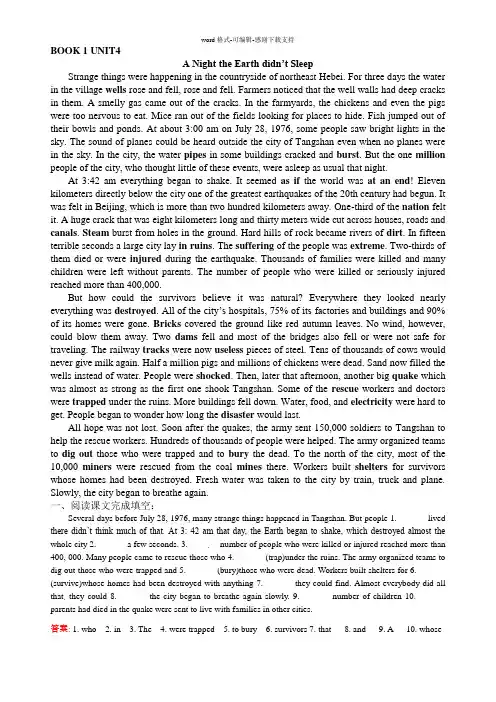
BOOK 1 UNIT4A Night the Earth didn’t SleepStrange things were happening in the countryside of northeast Hebei. For three days the water in the village wells rose and fell, rose and fell. Farmers noticed that the well walls had deep cracks in them. A smelly gas came out of the cracks. In the farmyards, the chickens and even the pigs were too nervous to eat. Mice ran out of the fields looking for places to hide. Fish jumped out of their bowls and ponds. At about 3:00 am on July 28, 1976, some people saw bright lights in the sky. The sound of planes could be heard outside the city of Tangshan even when no planes were in the sky. In the city, the water pipes in some buildings cracked and burst. But the one million people of the city, who thought little of these events, were asleep as usual that night.At 3:42 am everything began to shake. It seemed as if the world was at an end! Eleven kilometers directly below the city one of the greatest earthquakes of the 20th century had begun. It was felt in Beijing, which is more than two hundred kilometers away. One-third of the nation felt it. A huge crack that was eight kilometers long and thirty meters wide cut across houses, roads and canals. Steam burst from holes in the ground. Hard hills of rock became rivers of dirt. In fifteen terrible seconds a large city lay in ruins. The suffering of the people was extreme. Two-thirds of them died or were injured during the earthquake. Thousands of families were killed and many children were left without parents. The number of people who were killed or seriously injured reached more than 400,000.But how could the survivors believe it was natural? Everywhere they looked nearly everything was destroyed. All of the city’s hospitals, 75% of its factories and buildings and 90% of its homes were gone. Bricks covered the ground like red autumn leaves. No wind, however, could blow them away. Two dams fell and most of the bridges also fell or were not safe for traveling. The railway tracks were now useless pieces of steel. Tens of thousands of cows would never give milk again. Half a million pigs and millions of chickens were dead. Sand now filled the wells instead of water. People were shocked. Then, later that afternoon, another big quake which was almost as strong as the first one shook Tangshan. Some of the rescue workers and doctors were trapped under the ruins. More buildings fell down. Water, food, and electricity were hard to get. People began to wonder how long the disaster would last.All hope was not lost. Soon after the quakes, the army sent 150,000 soldiers to Tangshan to help the rescue workers. Hundreds of thousands of people were helped. The army organized teams to dig out those who were trapped and to bury the dead. To the north of the city, most of the 10,000 miners were rescued from the coal mines there. Workers built shelters for survivors whose homes had been destroyed. Fresh water was taken to the city by train, truck and plane. Slowly, the city began to breathe again.一、阅读课文完成填空:Several days before July 28, 1976, many strange things happened in Tangshan. But people 1. ______ lived there didn’t think much of that. At 3: 42 am that day, the Earth began to shake, which destroyed almost the whole city 2. ______ a few seconds. 3. ______ number of people who were killed or injured reached more than 400, 000. Many people came to rescue those who 4. ______ (trap)under the ruins. The army organized teams to dig out those who were trapped and 5. ______ (bury)those who were dead. Workers built shelters for 6. ______ (survive)whose homes had been destroyed with anything 7. ______ they could find. Almost everybody did all that they could 8. ______ the city began to breathe again slowly. 9. ______ number of children 10. ______ parents had died in the quake were sent to live with families in other cities.答案: 1. who 2. in 3. The 4. were trapped 5. to bury 6. survivors 7. that 8. and 9. A 10. whose二、语法单句填空:1. It is the custom in Britain that young people often do not______ (shake)hands when they meet someone for the first time.2. The rain has rained for half a month, completely______ (ruin)our holiday.3. People are curious to get the latest information about many natural______ (disaster), such as earthquake, typhoon and snowstorm.4. The mother, along with her two children, ______ (rescue)from the sinking boat by a passing ship.5. We sent our______ (congratulate)to her when she passed the exam.6. People were______ (shock)by t he eruption of the volcano, for it was even greater than they had expected.7. (judge) from what he has been doing, Mr. Smith seems to be a person we can depend on.8. He was dead and______(bury)at the top of the hill.9. The stranger shook me by the hand warmly as if he (be) to say he knew me well.10. The women (injure) in the accident should be given first aid.11. On hearing the news that her son had won the game, she burst laughter.12. The war was finally an end.13. I am looking forward to the day my daughter can read this book and know my feelings for her.14. Some people were dug from the fallen building after the earthquake, which excited many people.15. The cow (frighten) by the fire rushed out into the street.16. Luckily, the traffic accident didn’t do damage either of the cars.17. his parents expected, he was accepted as a member by the big company.答案:1. shake 2. ruining 3. disasters 4. was rescued 5. congratulations 6. shocked7. Judging 8. buried 9. were 10. injured 11.into 12.at 13. when 14. out 15.frightened 16. to 17. As。
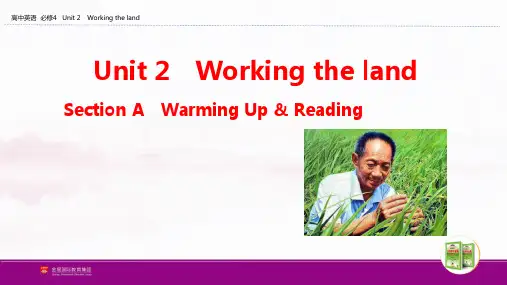
2020牛津译林版新教材选择性必修一课文原文U4 Exploring poetryReadingPoetry is a combination of "sound" and "sense". More than any other type of literature, it usually implies a deeper meaning beyond the words on the page. So, how to reveal this hidden dimension?First, follow your ears. While you may ask "What does it mean?" as you begin reading a poem, it is better to ask "How does it sound?" Even if its true meaning appears to be beyond your grasp, you can always say something about how the poem sounds when you read it aloud. Do you detect a rhythm? Are there any repeated words, rhymes or other special effects? All of these are good qualities to notice, and they may lead you to a better understanding of the poem in the end. Read these lines to feel how they sound.Sweet and low, sweet and low,Wind of the western sea,Low, low, breathe and blow,Wind of the western sea!Over the rolling waters go,Come from the dying moon, and blow,Blow him again to me;While my little one, while my pretty one, sleeps.(From "Sweet and Low" by Alfred Tennyson)Second, approach the poem as if you were an explorer in an unfamiliar landscape. Ask some basic questions about the poem. Who is talking? Who is being talked to? What is being described? Is there a sense of place? Are there other people or objects there? As you explore the poem, you will begin to see images in your mind. What are those images, and what happens when they are put together? This combination is often complex or even contradictory. As you slowly explore your surroundings, you will start to dig up clues that give you a greater understanding of the poem. Read these lines, pay attention to the image of the caged bird and try to find out what it means.The caged bird singswith a fearful trillof things unknownbut longed for stilland his tune is heardon the distant hillfor the caged birdsings of freedom.(From "Caged Bird" by Maya Angelou)Third, if you are still struggling to interpret the meaning of a poem even with much painstaking effort, just have some patience. You cannot really understand a poem that you have only read once. Sometimes reading a poem can be a lifelong job. So if you do not get it, set the poem aside and come back to it later. As an explorer, you will not reach your goal immediately—you need to go on a journey to a remote and unknown destination. This may seem difficult at first, but when you finally make your great discovery, your efforts will be rewarded. Poems that are easy to understand are often less interesting than those that constantly reveal deeper and previously unrecognized meanings. Read these lines and try to find out what they mean.Whose woods these are I think I know.His house is in the village though;He will not see me stopping hereTo watch his woods fill up with snow.(From "Stopping by Woods on a Snowy Evening”by Robert Frost)Finally, remember that you do not have to fully understand a poem to appreciate it. You might need to abandon logical thinking to discover its true inner beauty. As long as the journey of poetry reading makes you feel something or lets you perceive another level of meaning, it will have been worth your effort.Poetry's combination of "sound" and "sense" makes you see the world in a new way and allows you to go beyond normal reality for the everlasting beauty. Enjoy your journey in the world of poetry!Extended readingA hundred feet the temple towers;I can reach out for the stars in the sky.But I dare not speak in a voice loud,For fear of scaring dwellers on high.("A Night Stay at a Mountain Temple")It is believed that this poem was written by Li Bai in his teenage years. With striking imagination in expressions like "scaring dwellers on high”, this early poem already displayed signs of a romantic style, which was later to characterize Li Bai's poetry.Li Bai's love of reading and travelling from an early age contributed to his romantic style. He started studying the classics when he was only five years old, and was reading ancient philosophers of different schools at the age of ten, including Confucianism and Taoism. By reading books of all kinds, from legends to historical stories, he familiarized himself with classical Chinese culture, and more importantly, he acquired the wisdom of previous generations.Driven by a burning desire for adventure and travel, Li Bai left home and started to travel around in his early twenties. His footsteps covered almost the whole country. During his travels, he visited famous mountains and great rivers, encountering different customs and practices. These travelling experiences also nourished his love of nature and inspired him to write numerous poems in the romantic style.Li Bai's romantic style was also deeply rooted in the social and historical context in which he lived. Li Bai grew up in the most glorious period of the Tang Dynasty, a time of economic boom and social stability. This open and tolerant atmosphere allowed Li Bai the liberty to develop a free and unconstrained personality, which, in turn, had a huge impact on his poetic production.Given his personal experiences and the historical background, it is only natural to see that the majority of Li Bai's poems are characterized by the romantic style. Even the most uninformed reader would not fail to be impressed by the poet's rich imagination. The moon and stars in the sky, the natural landscape and the figures in legends all become a vehicle for his imagination. Equally impressive is Li Bai's free expression of strong feelings, which breathes vitality into the lifeless objects he describes, and which distinguishes him from other landscape poets. These features are inseparable from Li Bai's wide use of exaggeration, metaphor and other artistic techniques. The poem below, written in his fifties, is representative of his romantic style:My silver hair is three thousand feet long,Because my sorrow is deep and strong.How can the autumn frost whiteBe cast into the mirror bright?("Autumn Frost")With his extraordinary imagination, free expression of strong feelings and mastery of language, Li Bai is widely recognized as the greatest romantic poet after Qu Yuan. Generations of poets, both in China and abroad, owe a debt to his inspirational poems. One such poet is Ezra Pound, a 20th-century American poet. He was fascinated by Li Bai's poems and translated some of them in his 1915 poetry collection entitled Cathay. Today Li Bai's poetry continues to be enjoyed by countless readers around the world.。
Unit 1 Looking forwardsUnderstanding ideas (P 2-3)Facing the Future面对未来1 For many of us, it’s something we already have experienced. One moment, we are lying comfortably in bed, about to fall into a deep sleep. The next, our eyes are open and we find ourselves wondering or even worrying about possibly the most important issue of our lives—the future. Will we get into the school of our choice? What will we be doing in ten years’ time? Can we become the person we really want to be? In the face of such questions, how should we approach the future? Can we take action to shape it, or should we just accept whatever comes our way?我们许多人都有过这样的经历。
前一刻,我们正惬意地躺在床上,即将进入深度睡眠。
但下一刻,我们就睁开了双眼,发现自己在思考,甚至在担忧可能是人生中最重要的事情——未来。
我们能进入心仪的学校吗?十年之后我们会在做什么?我们能够成为真正想成为的人吗?面对这些疑问,我们应该如何迎接未来呢?我们能否采取行动去影响未来,还是该全然接受现实给予我们的一切呢?2 As many of us already know, having plans in place for the future is no guarantee that they will become reality. In this respect some people are more fortunate than others, as can be illustrated by comparing the lives of two famous authors, born 40 years apart. Although they shared the same ambitious and energetic approach to life, their careers unfolded in contrasting ways.正如我们许多人都知道的那样,对未来有计划并不能保证它们都会成为现实。
1.必修四Module1 The City of the Future未来城市What will the city of the future look like?未来的城市会是什么样子呢?No one knows for sure, and making predictions is a risky business. 没有人确切的了解,预测也是一件很危险的事情。
But one thing is certain---they are going to get bigger before they get smaller.但是有一件事情是可以肯定的---他们将会先变大,然后再变小。
In the future, care for the environment will become very important as earth's natural resources run out. 在未来,爱护环境将会很重要,因为地球的资源将濒临枯竭。
We will use lots of recycled materials, such as plastic, aluminum, steel, glass, wood and paper, and we will waste fewer natural resources. 我们将会使用大量的可回收材料,例如,塑料、铝、钢铁、玻璃、木头和纸。
我们浪费自然资源的程度将会有所减弱。
We will also have to rely more on alternative energy, such as solar and wind power.我们也将不得不更多地依赖其他能源。
例如,太阳能和风能。
All this seems certain, but there are plenty of things about city life in the future which are not certain. 所有的这些似乎是肯定的,但是还有许多关于城市生活的事情仍是未知的。
必修四 Unit 3 A Taste of English Humour 品味英国人的幽默 I . Vocabularyhumour n.幽默;滑稽 punchline n.故事、笑话中的妙语; 关键语 verbal adj.口头上 nonverbal adj.不用语言的 mime n. 哑剧 comedy n.戏剧 up to now 直到现在 brighten vt.使更愉快;使更有希望 depressed adj.忧愁的;沮丧的 content adj.满足的;满意的 feel/be content with 对…满足 astonish vt.使惊诧 astonishing adj.令人感到惊讶的 fortunate adj.幸运的;吉利的 unfortunately adv.不幸地 badly off 穷的;缺少的 ordinary adj.平常的;普通的bored adj.厌烦的subtle adj.微妙的;精巧的;技艺精湛的 entertain vt. & vi.使欢乐;款待 entertaining adj.愉快的;有趣的 charming adj.迷人的;有魅力的 tramp n.流浪的;行乞者 throughout prep.遍及;贯穿 adv.到处;始终;全部 moustache n.小胡子 worn adj.用旧的;用坏的;破烂的 worn-out adj.磨破的;穿旧的stiffly adv.僵硬地 failure n.失败(者) optimism n.乐观;乐观主义 overcome vt. & vi.战胜;克服 underdog n.失败者;处于劣势的一方 snowstorm n.暴风雪 leather n. 皮革pick out 挑出;辨别出cut off 切断;断绝 chew vt. & vi.咀嚼mouthful n.一口;满口enjoyment n.享受;欢乐;乐趣convince vt.使信服convincing adj.令人信服的direct vt. & vi.导演;指示;指挥star in 担任主角;主演outstanding adj.突出的;杰出的confidence n.信心;信念costume n.服装;戏装gesture n.姿态;手势 II. Reading A MASTER OF NONVERBAL HUMOUR 无语的幽默大师As Victor Hugo once said, “Laughter is the sun that drives winter from thehuman face ”, and up to now nobody has been able to do this better than CharlieChaplin.正如维克特·雨果曾经所说的:“欢笑就是驱走人们脸上冬霭的阳光”,至今为止,在这方面查理·卓别林做得最好。
Unit 1 Women of achievementWarming UpExamine the following six women using the rules about what makes a great person. In pairs discuss what they have in common and what makes them great. Give your reasons.1.Joan of Arc was a girl from the countryside who dressed as a man and went to fight for the French. She helped drive the English out of France. She was caught and put to death by the English.2.Elizabeth Fry was a Quaker. She helped improve prison conditions and gave prisoners work and education. Her work helped the Quakers get the Nobel peace prize in 1947.3.Song Qingling, Dr Sun Yat-sen’s wife, was one of the top leaders in modern Chinese history. She concerned herself with welfare projects, especially the China Welfare Institute for women and children.4.Lin Qiaozhi was a doctor who became a specialist in women’s illnesses. She devoted all her life to medical work for Chinese women and children. Her work encouraged many other women to become doctors.5.As a young girl, she always wanted to study animals. She went to Africa and studied chimps instead of going to university. Her research showed the connections between chimps and human beings. She works to protect chimps everywhere.6.Jody Williams helped found and international campaign to stop the making of landmines. She also worked hard to make as many countries as possible agree not touse them. She and her organization were given the Nobel Peace Prize in 1997. ReadingA STUDENT OF AFRICAN WILDLIFE①It is 5:45 am and the sun is just rising over Gombe National Park in East Africa.②Following Jane’s way or studying chimps, our group are all going to visit them in the forest.③Jane has studied these families of chimps for many years and helped people understand how much they behave like humans.④Watching a family of chimps wake up is our first activity of the day.⑤This means going back to the place where we left the family sleeping in a tree the night before.⑥Everybody sits and waits in the shade of the trees while the family begins to wake up and move off.⑦Then we follow as they wander into the forest.⑧Most of the time, chimps either feed or clean each other as a way of showing love in their family.⑨Jane warns us that our group is going to be very tired and dirty by the afternoon and she is right.⑩However, the evening makes it all worthwhile.11We watch the mother chimp and her babies play in the tree.12Then we see them go to sleep together in their nest for the night.13We realize that the bond between members of a chimp family is as strong as in a human family.14Nobody before Jane fully understood chimp behaviour.15She spent years observing and recording their daily activities.16Since her childhood she had wanted to work with animals in their own environment.17However, this was not easy.18When she first arrived in Gombe in 1960, it was unusual for a woman to live in the forest.19Only after her mother came to help her for the first few months was she allowed to begin her project.20Her work changed the way people think about chimps.21For example, one important thing she discovered was that chimps hunt and eat meat.22Until then everyone had thought chimps ate only fruit and nuts.23She actually observed chimps as a group hunting a monkey and them eating it.24She also discovered how chimps communicate with each other, and her study of their body language helped her work out their social system.25For forty years Jane Goodall has been outspoken about making the rest of the world understand and respect the life of these animals.26She has argued that wild animals should be left in the wild and not used forentertainment or advertisements.27She has helped to set up special places where they can live safely.28She is leading a busy life but she says:29”Once I stop, it all comes crowding in and I remember the chimps in laboratories.30It’s terrible.31It affects me when I watch the wild chimps.32I say to myself, ‘Aren’t they lucky?’33And then I think about small chimps in cages though they have done nothing wrong.34Once you have seen that you can never forget...”35She has achieved everything she wanted to do:36working with animals in their own environment, gaining a doctor’s degree and showing that women can live in the forest as men can.37She inspires those who want to cheer the achievements of women.WHY NOT CARRY ON HER GOOD WORK?①I enjoyed English, biology, and chemistry at school, but which one should I choose to study at university?②I did not know the answer until one evening when I sat down at the computer to do some research on great women of China.③By chance I came across an article about a doctor called Lin Qiaozhi, aspecialist in women’s diseases. She lived from 1901 to 1983.④It seemed that she had been very busy in her chosen career, travelling abroad to study as well as writing books and articles.⑤One of them caught my eye.⑥It was a small book explaining how to cut the death rate from having and caring for babies.⑦She gave some simple rules to follow for keeping babies clean, healthy and free from sickness.⑧Why dis she write that?⑨Who were the women that Lin Qiaozhi thought needed this advice?⑩I looked carefully at the text and realized that it was intended for women in the countryside.11Perhaps if they had an emergency they could not reach a doctor.12Suddenly it hit me how difficult it was for a woman to get medical training at that time.13That was a generation when girls’ education was always placed second to boy’s.14Was she so much cleverer than anyone else?15Further reading made me realize that it was hard work and determination as well as her gentle nature that got her into medical school.16What made her succeed later on was the kindness and consideration sheshowed to all her patients.17There was story after story of how Lin Qiaozhi, tired after a day’s work, went late at night to deliver a baby for a poor family who could not pay her.18By now I could not wait to find out more about her.19I discovered that Lin Qiaozhi had devoted her whole life to her patients and had chosen not to have a family of her own.20Instead she made sure that about 50000 babies were safely delivered.21By this time I was very excited.22Why not study at medical college like Lin Qiaozhi and carry on her good work?23It was still not too late for me to improve my studies, prepare for the university entrance examinations, and ...第一单元第二篇课文,背诵课文提醒文字:1.在学校我喜欢英语,生物和化学,但我应该选择哪一个在大学学习?2.直到有一天晚上,当我坐在电脑前研究中国的伟大女性才知道答案。